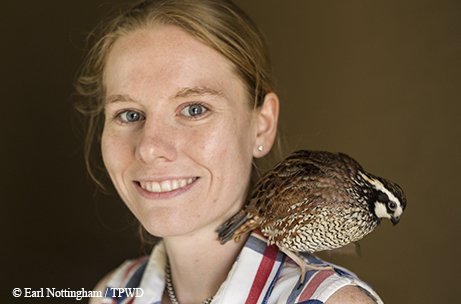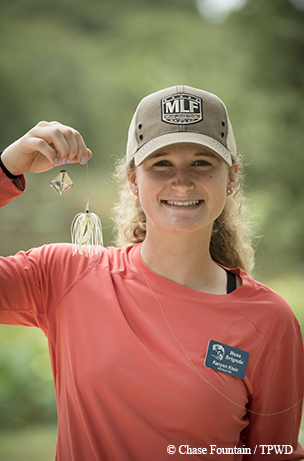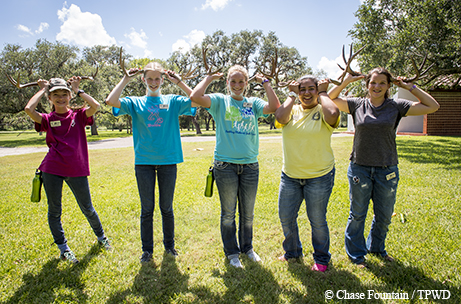
Texas Brigades
Teenagers become conservation leaders at Texas Brigades summer camps.
by Aubry Buzek
“They say the only way to predict the future is to create it,” Dale Rollins declares as he watches the covey of teenage campers affectionately nicknamed the “California Girls” taking turns shooting bright orange clay targets out of the sky.
Inside the renovated schoolhouse nearby, another covey of campers is learning to taxidermy delicate bobwhite quail, carefully recreating their natural flight position and securing the birds to varnished Texas-shaped wooden boards. Yet another group surrounds a pair of computers, painstakingly arranging and scanning the quail-favored native plants they collected from nearby fields.
After the last pop of the shotgun subsides, Rollins finishes his thought: “I like to think that we are helping to create the future here.”

The Rolling Plains Bobwhite Brigade, held annually at Centennial Lodge in Coleman, is a conservation leadership summer camp devoted to teaching teenage students about Texas quail. But this is not your typical summer camp, and the campers learn about far more than just quail.
There are moments in the camp, when the campers are pushed past their mental and physical comfort zones, in which they experience substantial personal transformation. When the cadets are alone at the podium, answering tough questions and defending their stance on conservation policies; marching as a team, executing each step and utterance perfectly in sync with the campers around them; or facing a group of nearly a hundred adults, digging deep to muster up their loudest, bravest war cry — that’s where their attitudes are being shaped.
Rollins, a noted quail guru who holds a doctorate in range management from Texas Tech University, dreamed up the Bobwhite Brigade summer camp 25 years ago after his love for bobwhite quail was reignited by his bird dog, Suzie. He enlisted a loyal group of volunteers to help develop a program that would transform the campers who attended, designing a "quail-centric" syllabus and establishing camp traditions based on his own passions as a self-proclaimed “quote-aholic,” admirer of Audie Murphy and other war heroes and, most of all, lover of bird dogs and quail.
The camp model established in 1993 is much the same as the finely oiled machine that runs today, and many of those original volunteers still come back year after year to keep the standards high. In the classroom, expert instructors teach in-depth seminars on quail anatomy, behavior and habitat as well as hunter’s ethics, taxidermy, firearm handling and bird dog handling. Military traditions like cadence calling and marching are practiced every day to bring the cadets together to work as a team, and shared cleanup duties and late-night group study sessions develop personal discipline and a work ethic.

Bobwhite Brigade
But the cadets have fun, too. Woven into the camp routine are evening highlight reels showing the photos and bloopers from the day, silly dances performed to earn back misplaced items like water bottles and pencils, and energy-building cadences sung loud to playfully heckle the other groups. This year, a live bobwhite quail named Kirby frequently announced his presence to the classroom, yelling “Bob … WHITE!” with perfect comedic timing.
The influence of the Rolling Plains Bobwhite Brigade goes beyond these chanting students. In addition to inspiring the creation of similar camps in other states, it set the foundation for the nonprofit Texas Brigades, which formed in 2000 to manage and grow the program. Texas Brigades now oversees eight wildlife conservation leadership summer camps, including Rolling Plains Bobwhite Brigade, South Texas Buckskin Brigade, South Texas Bobwhite Brigade, Bass Brigade, Waterfowl Brigade, Ranch Brigade, North Texas Buckskin Brigade and Coastal Brigade.
Each camp has a different charismatic species of focus, but like Bobwhite Brigade, all of the camps use those species as a vehicle to develop youths proficient in public speaking and critical thinking — the intangible qualities that make up the heart of future conservation leaders.
“These camps are all about wildlife and conservation, but for me the hidden message here is public speaking,” says Bass Brigade program coordinator Steve Bardin. “We’re using the largemouth bass as a teaching tool. It’s about being comfortable in yourself and being able to get into a group of people and have a conversation, or to lead a conversation if you need to.”
Eli Jenkins, 15, of Dickens — the top cadet of the 25th Battalion of Bobwhite Brigade — has a clear vision of his takeaway from the camp.
“We had fun and we learned, but no other camp could teach us the leadership and the speaking skills like this one,” he says. “This camp is made to train us to become some lean, mean, conservation presentation-making machines.”
The confident, outgoing students who fill the camps with conversation and laughter on Day Five are a stark contrast to the quiet, reserved group of cadets who show up on Day One. Almost every brigade instructor has received what Rollins likes to call “heart medicine” — parents reaching out to the staff after graduation to thank them and ask “Who is this kid?” when they see a transformation.
“What a difference five days makes! When we have graduation they are completely different individuals than when they first checked in,” says Bass Brigade instructor and professional angler Gary Klein. “It’s amazing to watch how they bond, everything that they do, the relationships that they build. These camps are phenomenal, absolutely phenomenal.”

Bass Brigade
One returning cadet to Bass Brigade this year, Ross Michaels, 18, of Alba, can attest to the confidence-building nature of the camps and the long-term results. Growing up, Michaels struggled with social interaction, and social dyslexia created a barrier to comfortably communicating and connecting with his classmates and peers.
“At Bass Brigade, I found an environment that was completely positive — I could talk to anyone, and they wouldn’t judge me,” Michaels says. “Coming here helped break some of the shell away from the mask I’ve always put up.”
After one brigade experience, he knew he had to return.
“It’s just like fishing,” Michaels says. “When I was younger, it only took one fish and I got hooked on it. It only took feeling the positive energy of this place once to hook me.”
To return to camp, cadets compete to earn a spot as an assistant group leader or special agent by conducting community engagement and outreach projects. Michaels took his newfound confidence back to his community, giving presentations and talking to hundreds of people one-on-one to spread the word of Bass Brigade to East Texas.
Now a special agent, Michaels assists the instructors, using his knowledge to not only aid cadets with technical tasks like fly tying and casting, but also to mentor the younger campers, many of whom may be experiencing low confidence or hesitation with public speaking.
“Being a special agent is a position that I really wanted because it gives me a chance to repay my debt and all that I received from the instructors,” Michaels says. “If I can get a kid to go back to his hometown and have such a change like it had with me, then that’s better than anything in the world.”
econd-year Rolling Plains Bobwhite Brigade alumni Madison Franks, 15, of Idalou, says the push to give presentations about her experience with Texas Brigades in her community not only earned her a place back in camp this year as an assistant covey leader, it gave her the opportunity to make contacts and attend research projects with Texas Parks and Wildlife Department biologists and Texas Tech University professors and graduate students.
“That has opened so many doors for me,” Franks says. “Not only have I been able to go on mule deer and pronghorn captures, it surely furthered my involvement in wildlife conservation and even the brigades in general. I have been truly blessed by the opportunities this camp has provided to me.”
For her parents, Amy and Cory Franks, the effects of the camps were “dramatic, for sure.”
“We saw an extreme turnaround — a personal transformation from being a little on the shy side to extremely outgoing,” Cory Franks says. “We were caught off-guard on what the camp actually was. I was thinking it was more that they would learn about wildlife — not about the life lessons that were gained. There were a lot of life lessons that we really didn’t see coming.”

Buckskin Brigade
Although the instructors push the campers to their limits, the intensity is something that keeps devoted campers coming back year after year. Allison “Allie” Cooper, 16, from Front Royal, Virginia, has traveled from out of the state to attend five Texas Brigades camps for the last three years. Although she admits the camps are “extremely intensive,” she says the amount of knowledge and perspective she has gained has been worth every minute of the early morning marching and late-night projects.
“I’ve been to several brigades camps, and every time I leave I feel a deeper passion for the land and a more intense yearning to go out and make a difference and spread education,” Cooper says. “It’s a really amazing opportunity.”
Like Cooper, many returning campers become converts to the conservation lifestyle, saying that the camps have inspired them to pursue careers in wildlife biology or other related fields. For those campers, the relationships they build with the instructors — many at the peak of their careers — can turn into lifelong contacts they can lean on as they progress through their careers.
And while that is a perk, it’s not the end goal of the program.
“We’ve always said we are not trying to train game wardens, we are not trying to train wildlife biologists — although we will get some of those,” Rollins says. “I am looking forward to our first federal judge that’s been to a Bobwhite Brigade.”
Since its inception, the Bobwhite Brigade has graduated some 728 teenagers, and the Texas Brigades has churned out more than 3,000 overall. Not even close to all of those became game wardens or wildlife biologists. The rest became the next generation of influencers, voters and managers, all equipped to follow their passion with self-confidence, public speaking skills and a high level of conservation knowledge.
“That’s one thing we try to reiterate to the campers,” Bardin says. “Whatever you’re passionate about, go for it. If you have a passion, try to make sure you don’t have any regrets later on in life because you didn’t follow it.”
To help campers pursue that passion, in whatever field it may be, the Texas Brigades offers scholarships for returning students who serve in leadership positions at the camp. To date, Texas Brigades, through many generous public and private sponsors, has provided more than $475,000 in college scholarships to past cadets.
That financial support, combined with the lifelong personal and professional support, emphasizes a simple yet profound message Rollins gave to the campers during his 25th anniversary evening vespers.
“Invest in the future,” Rollins advised them. “The dividends are incredible.”
Tell me more!
Texas Brigades camp programs run every summer across the state, with camps focusing on deer, quail, bass, waterfowl, cattle and marine life. Students must be 13 to 17 years old. The $500 tuition covers all meals, lodging and supplies. For more information, visit www.texasbrigades.org.
Related stories

